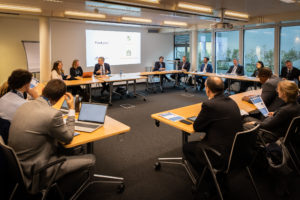NINTH ANNUAL GENERAL ASSEMBLY REPORT
The ninth Annual General Assembly (AGA) of ICoCA took place in Geneva, Switzerland from 5 to 7 December 2022. The first two days were open to ICoCA Members, Affiliates, Observers and invited experts only, while the third day was open to the general public as well. This year marked the resumption of in-person meetings, after the 2020 and 2021 AGAs had taken place virtually due to the COVID-19 pandemic.

A new format to facilitate debate on emerging issues and share best practice on Code implementation
As in previous years, pillar meetings were convened, providing opportunity for Members, Affiliates and Observers to review implementation of goals included in the 2019-2023 ICoCA Strategic Plan during the last 12 months and to begin consideration of new strategic objectives beyond 2023.
Building on popular demand, this year the AGA offered up a series of parallel thematic and training sessions for attendees to choose from. Four training workshops provided hands-on advice for companies on a range of topics, including: how to conduct human rights impact assessments; the prevention of sexual exploitation and abuse; the prevention of modern slavery; and how to operate an effective grievance mechanism. Alongside these workshops, thematic sessions provided attendees with an update on research conducted to date by ICoCA on a number of issues at the interface of private security provision and respect for human rights, including: handing of people in vulnerable situations; the use of new technologies; the role of mandatory human rights due diligence; and the working conditions of private security personnel.

A number of red-threads surfaced through these thematic debates. First, was the diversification and growth of services being outsourced to private security companies and the increasing number of technological tools at their disposal. While there can be upsides, this can also impact both the structural and personnel-related drivers of abuse within the sector. Secondly, and compounding this, is the treatment and welfare of private security personnel themselves. Indeed, research confirmed that an overworked, underpaid, and poorly trained guard-force represents one of the largest human rights risks within the sector. This too often results in guards themselves, as the abused, becoming the abuser. Third, is the window of opportunity that now exists to align the Code with a developing body of mandatory supply chain human rights due diligence regulation and help the users of private security begin to address some of these systemic problems throughout supply chains.
ICoCA guidance documents and online training modules, along with training tools developed by external partner organisations, such as Verité’s Responsible Sourcing Tool on Modern Slavery, provided the foundations for in-person exchange and sharing of best practice. Feedback from participants indicated a major strength of these sessions was the multi-stakeholder format, bringing a range of perspectives into the room with representatives coming from industry, civil society, government, observers and other invited experts. ICoCA’s online training courses are free to all personnel working for ICoCA Member and Affiliate companies. Courses include the prevention of sexual exploitation and abuse, why personnel must follow the Code and why companies must comply with the Code. A training on the use of force is in development and will soon be released. Courses are available in multiple languages, including French, Spanish, Portuguese, Russian, Chinese, Arabic, Swahili and Somali with more to be added. ICoCA invites companies to submit requests for new courses and additional languages.
Public Roundtables Tackle Topical Challenges
The third and final day, which was open to the general public, was formally opened by Ambassador Félix Baumann, Deputy Permanent Representative at the Permanent Mission of Switzerland to the United Nations Office and other International Organisations in Geneva. He noted that private security is now widely used by many different actors and across multiple contexts, and that ICoCA has developed mechanisms and tools to raise industry standards. ICoCA is nowadays seen as a sector-specific reference for the implementation of the UN Guiding Principles on Business and Human Rights (UNGPs) and many organisations now refer to ICoCA in their procurement policies.
 Three panel discussions during the day tackled some of the thorniest issues currently playing out on the world stage relating to the private security industry and respect for human rights and international humanitarian law. With the 2022 FIFA world cup in full-swing, intense media attention on the issue of human rights in Qatar and the Paris Olympic games just around the corner, the first panel on mega-sporting events provided a timely intervention honing in on the interplay between the rights of private security personnel, the players and athletes and supporters. As expressed by Guido Battaglia, Head of Policy and Outreach with the Centre for Sport and Human Rights, “private security actors are a key element in the delivery of mega sporting events in a safe and responsible way.” The second roundtable on ESG kick-started started a project to help investors better understand the human rights risks relating to companies within their investment portfolios that contract the services of private security providers. ICoCA is now developing an ESG guide to private security contracting in partnership with the Investor Alliance on Human Rights and ENACT and working with the Geneva Center for Human Rights to develop an ESG ratings methodology to help ESG ratings agencies better incorporate private security contracting practices. During the discussion Pranoti Surve, Senior Global Security Programmes at Philip Morris International, advised clients of private security companies to “think about the human rights of the security guard at the grassroot level rather than just thinking about the delivery of security services.” The final panel focused on the thorny topic of ‘private military companies and contractors’ (PMCs) and the future of conflict. Panellists reflected that while no binding international instruments exist that specifically address the obligations of PMCs, current efforts, including through ICoCA, to increase oversight and accountability of these actors in war zones, need to be supported and reinforced. “Misinformation and disinformation in the PMC sector […] are very convenient, because you cannot point the finger to find the culprit”, emphasised Alessandro Arduino, Principal Research Fellow, Middle East Institute (MEI), National University of Singapore & Associate, Lau China Institute, King’s College London.
Three panel discussions during the day tackled some of the thorniest issues currently playing out on the world stage relating to the private security industry and respect for human rights and international humanitarian law. With the 2022 FIFA world cup in full-swing, intense media attention on the issue of human rights in Qatar and the Paris Olympic games just around the corner, the first panel on mega-sporting events provided a timely intervention honing in on the interplay between the rights of private security personnel, the players and athletes and supporters. As expressed by Guido Battaglia, Head of Policy and Outreach with the Centre for Sport and Human Rights, “private security actors are a key element in the delivery of mega sporting events in a safe and responsible way.” The second roundtable on ESG kick-started started a project to help investors better understand the human rights risks relating to companies within their investment portfolios that contract the services of private security providers. ICoCA is now developing an ESG guide to private security contracting in partnership with the Investor Alliance on Human Rights and ENACT and working with the Geneva Center for Human Rights to develop an ESG ratings methodology to help ESG ratings agencies better incorporate private security contracting practices. During the discussion Pranoti Surve, Senior Global Security Programmes at Philip Morris International, advised clients of private security companies to “think about the human rights of the security guard at the grassroot level rather than just thinking about the delivery of security services.” The final panel focused on the thorny topic of ‘private military companies and contractors’ (PMCs) and the future of conflict. Panellists reflected that while no binding international instruments exist that specifically address the obligations of PMCs, current efforts, including through ICoCA, to increase oversight and accountability of these actors in war zones, need to be supported and reinforced. “Misinformation and disinformation in the PMC sector […] are very convenient, because you cannot point the finger to find the culprit”, emphasised Alessandro Arduino, Principal Research Fellow, Middle East Institute (MEI), National University of Singapore & Associate, Lau China Institute, King’s College London.
Looking forward to 2023 and beyond
The 2022 AGA was the catalyst beginning a year-long process to develop an ICoCA’s next Strategic Plan, to be launched at the Ten-Year Anniversary AGA scheduled to take place in Geneva, Switzerland, Dec 4-6, 2023. Frédéric Chenais, Chair of the ICoCA Board and Jamie Williamson, Executive Director of ICoCA, reflected on some key take-aways from the three-days of discussion and debate that will feed into this strategic planning process, including:
- PSCs are more and more present across different contexts, therefore, human rights risks associated with their use exist everywhere, not only in complex environments.
- New technologies are being used by PSCs and the regulatory framework is also evolving. Governments have a duty to build the capacity of PSCs to meet due diligence expectations.
- Clients need to better recognise and promote the value of responsible security. They play a key role in addressing the race to the bottom.
- Responsible security is a shared responsibility that cannot be delegated to providers exclusively, and developing dialogue and partnerships with key stakeholders to address this will be key.
- Working conditions of private security personnel become more and more important for responsible security provision as they influence personnel performance.
- There has been an increase in litigation for corporate accountability. As more supply chain due diligence laws come into effect, this trend is likely to continue and to grow, and ICoCA will need to position itself as a relevant mechanism with a complementary role to play within this emerging regulatory landscape.
Save the date: The 10th ICoCA AGA will be held in Geneva, Switzerland on Dec 4-6, 2023. We hope to see you there as we mark the 10th Anniversary of ICoCA, launch a new Strategic plan and provide an unparalleled forum for debate and sharing of best practice to raise private security industry standards that promote respect for human rights and international humanitarian law.

Download this report here, and view more photos from the event on this link.
